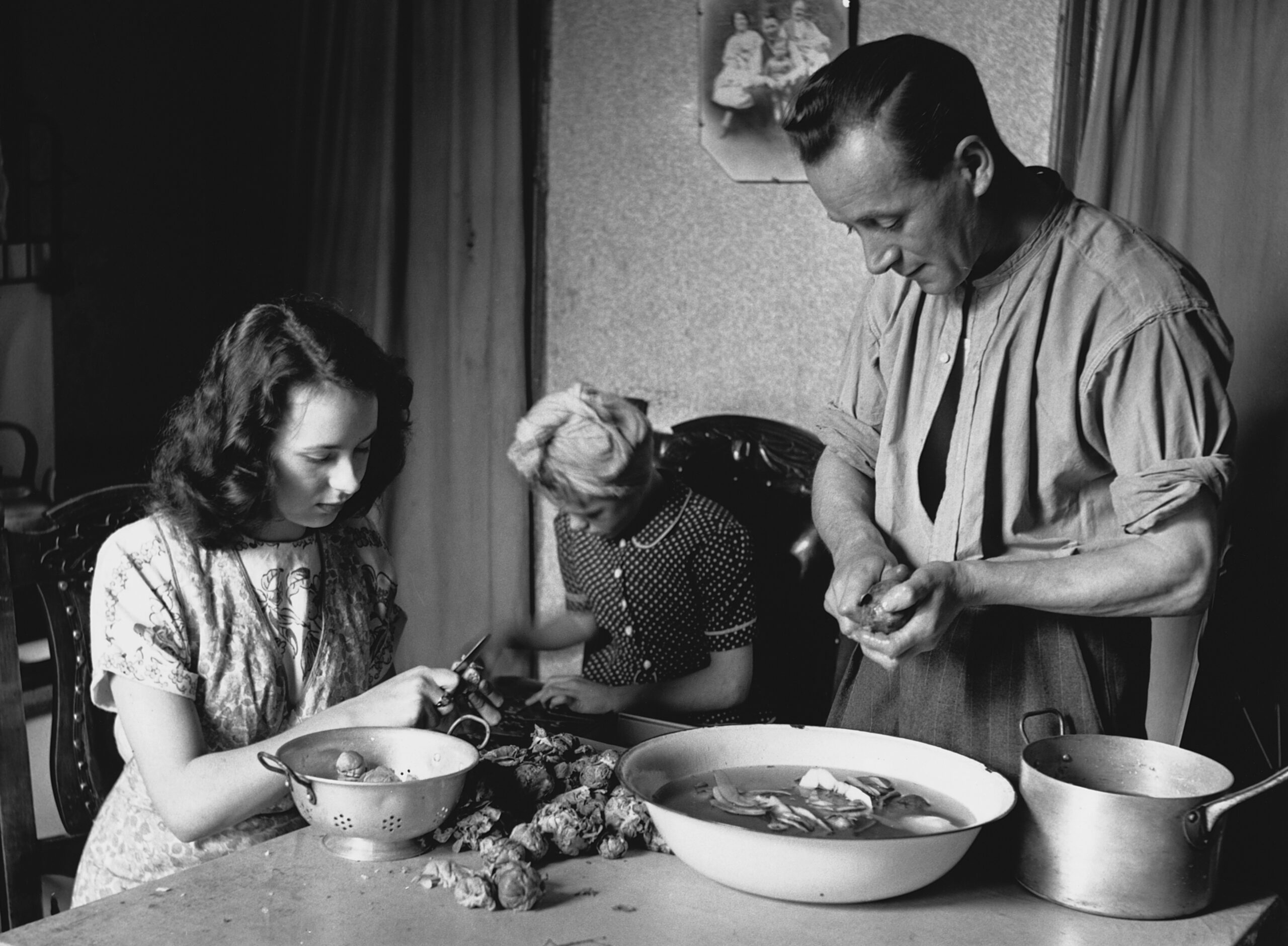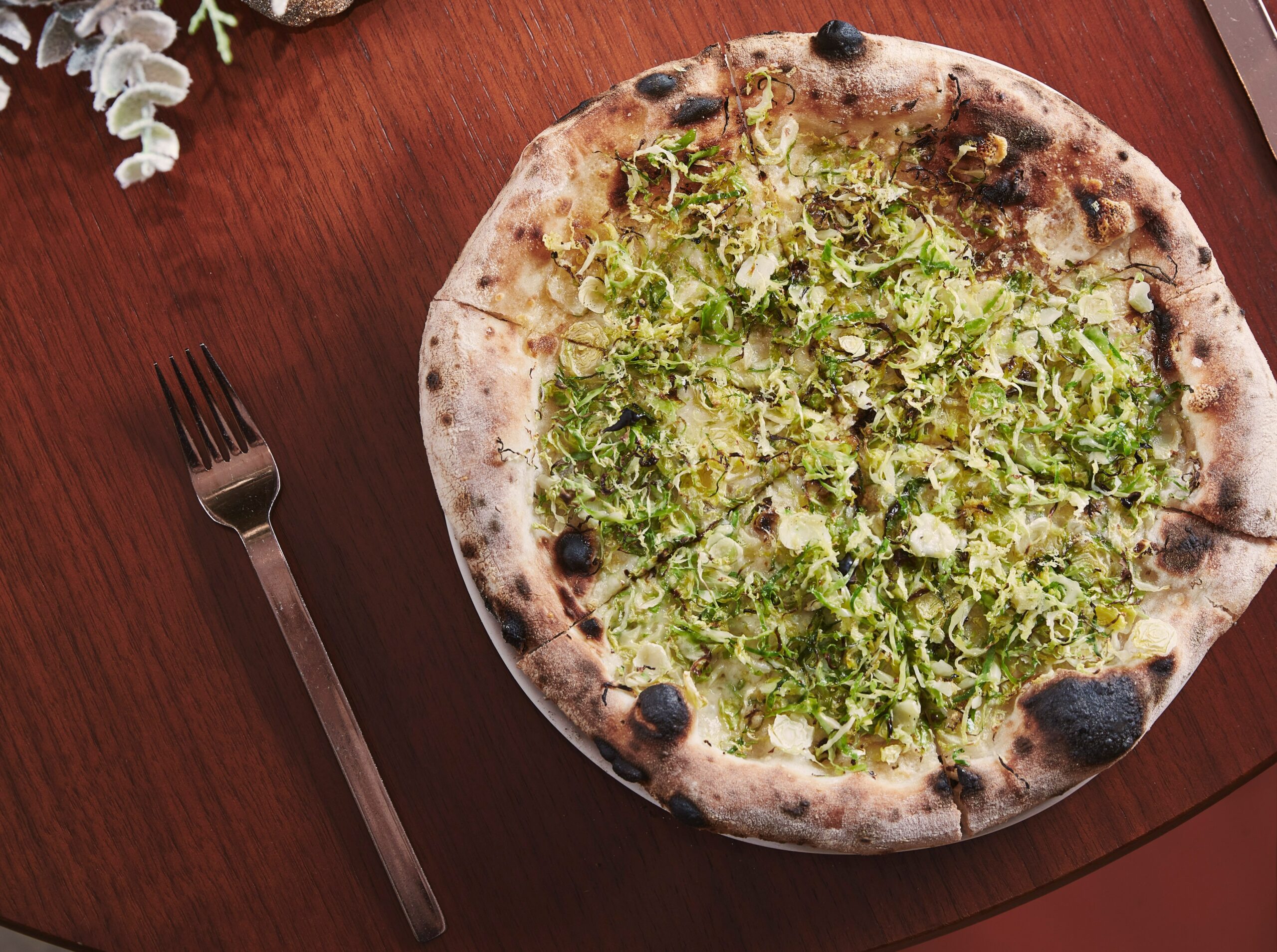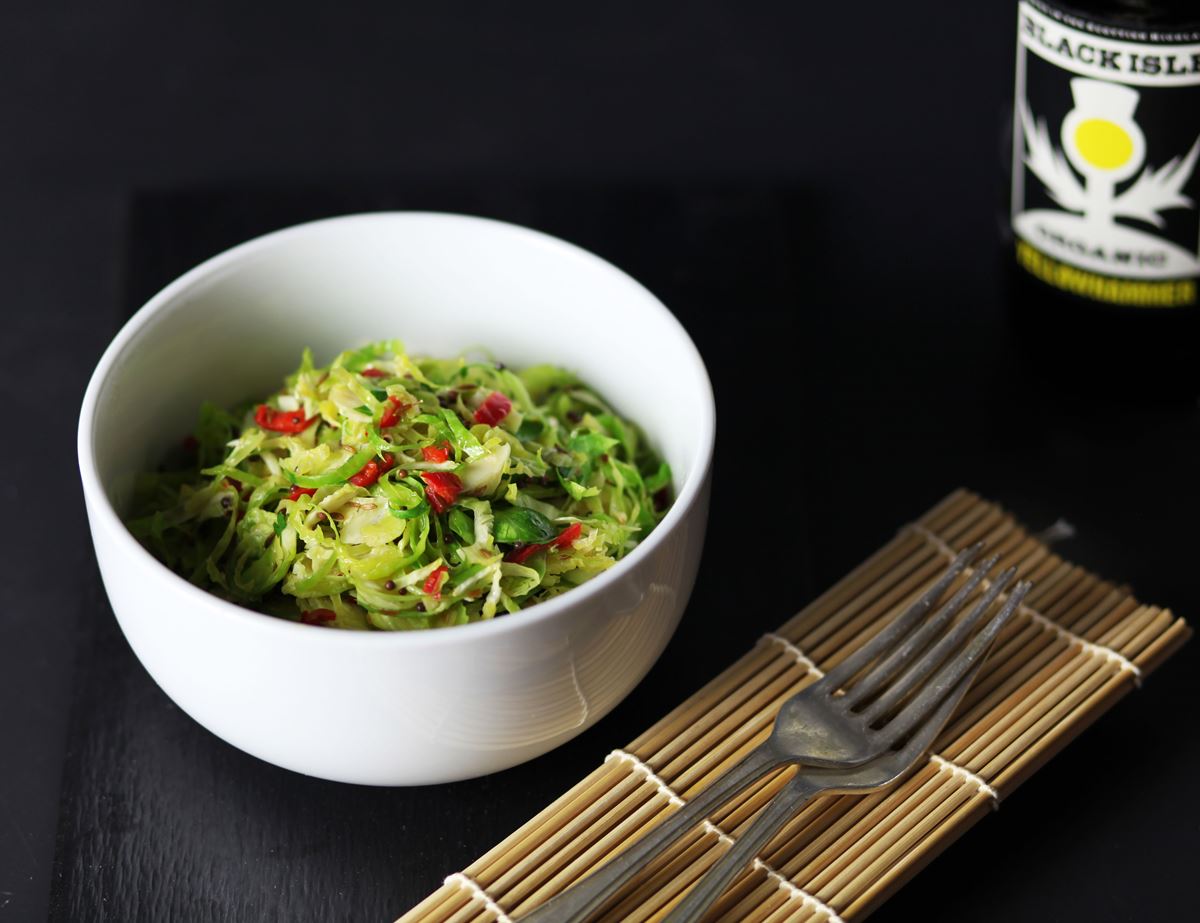It’s a cold night in December and I’m at Apricity, a chic, modern restaurant in one of London’s most exclusive postcodes. I am drinking, of all things, a sprout martini.
This “sproutini” is made with gin, distilled with sprout leaves, and a dash of vermouth. It is garnished with a tiny pickled sprout. It tastes like a very dirty martini: pickley, briny, delicious. It is perhaps the high watermark of a remarkable phenomenon that has become increasingly apparent over the past few years: sprouts are cool now.
The much-maligned brassica, once confined to the punchlines of jokes and the complaints of overstimulated children at the Christmas table, is now ubiquitous at the most fashionable restaurants.
At Offbeet in Southsea, Hampshire, you can get deep-fried Brussels sprouts, smothered in gochujang, a sticky-sweet Korean sauce, and served with smoked chestnut puree; and Abc Kitchens, a Mexican restaurant in London, offers Brussels sprout tacos and pizzas. Sprouts are a deeply underrated ingredient, its chef Ben Boeynaems, tells me.
Ben Boeynaems serves up sprout tacos at Abc Kitchens at The Emory hotel
ABC KITCHENS
What we are seeing is not just a change in fashionable whims and improved cooking methods. Sprouts themselves have undergone an evolution. If you tried sprouts as a child and thought they were horrible, and then again more recently and liked them, the chances are that you haven’t changed. The sprouts have.
Advertisement
Some background: first widely cultivated in 16th-century Brussels, sprouts contain naturally occurring chemical compounds called glucosinolates, also present in mustard and horseradish, which give them a pungent, sulphurous taste. About 50 per cent of us are more sensitive to this flavour, just as for some people coriander tastes like soap. “Children taste them more strongly than adults,” says Rob Miller, co-founder of Honest Umami, an MSG retailer, “so it’s quite common for kids to be like, ‘Yuck, sprouts are horrible’.”
• The best restaurants of the year — according to Charlotte Ivers
In the 1990s Hans van Doorn, a Dutch scientist, isolated the chemicals that make sprouts bitter and growers began selectively breeding their crops to favour those with lower levels. As a result, over the past couple of decades, that “yucky” taste has been slowly evolved out. “If you could time-travel a 1990s sprout to the present day,” says Miller, “and taste it alongside a modern sprout, the difference would be huge. The 1990s sprout would be so much more bitter.”

Sprouts have been a part of the Christmas dinner for decades but have been bred sweeter in recent years
HULTON-DEUTSCH COLLECTION/CORBIS/GETTY IMAGES
The arrival of newer, tastier sprouts soon brought them to the attention of professional chefs. The Americans got there before us. La Condesa, a high-end Mexican restaurant in California’s Napa Valley, was famed for its Brussels sprouts with bacon and red grapes as far back as 2011.
A few years ago, sprouts as high art made the journey across the Atlantic. As is so often the case in modern British cooking, Yotam Ottolenghi was in the vanguard, offering recipes for sprout and parmesan salad and a sprout slaw containing — what else, given that it’s Ottolenghi — pomegranate seeds.
Advertisement
This is just one example of the many ways in which sprouts have been a beneficiary of the globalisation of British cuisine. “When our head chef, Yahir [Gonzalez], came up with the idea, I was a little apprehensive,” says Tony Geary, co-owner of Zapote, a Mexican restaurant in Shoreditch, east London, which is serving chargrilled Brussels sprouts on a cashew mole. Geary grew up eating sprouts in 1980s Britain. “My sister’s been put off them for life,” he laughs.

Sprout pizza at Abc Kitchens
ABC KITCHENS
Gonzalez, however, had no such cultural baggage. “We don’t really have sprouts in Mexico,” he says. He started seeing sprouts “everywhere” at the farmers’ market he visits each Sunday, and decided to give them a go. (True to expectation, he also recommends frying sprouts with mescal.)
The rise of sprouts correlates with our becoming a “much foodier nation”, says Miller. In the more enlightened MasterChef era, the first instinct of the British cook is no longer to boil sprouts “about 400 times longer” than necessary, or indeed at all.
This is an observation so apt it once caused a high-level diplomatic incident. In 1944, when President Roosevelt was asked by Lady Churchill when he would next visit England, he responded that while he loved our country, he was perturbed by our way of cooking vegetables. “Take Brussels sprouts for instance, why do you boil them? But, if you must boil them, why do you leave the water in them when they are served?”

Watery sprouts almost spoilt the special relationship between Winston Churchill and Franklin Delano Roosevelt
PRINT COLLECTOR/GETTY IMAGES
Roosevelt insisted he would only return to England if Mrs Churchill promised “never to boil his sprouts”. Upon her return home, Churchill telephoned the American ambassador to find out more about how sprouts were done in the New World.
Advertisement
Churchill’s preference for boiling can be dated back to 1859 and the first recorded British recipe for sprouts, compiled by the food writer Eliza Acton, which called for the sprouts to be boiled for a horrifying eight to ten minutes. This may go some way to explaining the British discomfort with the vegetable.
• What not to say at Christmas — to avoid a family row
“Overcooking is the great downfall of the sprout,” says Hugh Fearnley-Whittingstall, of River Cottage. He attributes the golden age of sprouts to the fact that we’ve become more comfortable with plant-based cooking. “We realised that the fish and the meat have been hogging all of our attention and hogging the best cooking techniques,” he says.
Still, our lingering ambivalence towards the sprout means that, while restaurateurs are embracing the plant all year, for many home cooks, the “fixation is still very much on Christmas” says Fearnley-Whittingstall. He is working to change that. His new book, How to Eat 30 Plants a Week, makes extensive use of sprouts: in a dish of roast brassicas and butterbeans, for example, or stuffed into a majestic festive spiced squash.
The great joy is that these recipes barely scratch the surface of the hundreds of ways to cook a sprout. Roasted, sautéed, deep-fried: however you serve them, we are blessed to live in the salad days of the sprout.
Advertisement
Charlotte’s favourite sprouts recipe
Creamy Parmesan & Chilli Shredded Sprouts from Abel and Cole

ABEL & COLE
Ingredients
• 200g sprouts
• 1 lemon, juice and zest
• A pinch of sea salt and freshly ground pepper
• A gloss of olive oil
• A pinch of freshly chopped red chilli or chilli powder (to taste)
• 30g parmesan , freshly grated
• A handful of chopped almonds, roughly chopped. (Or pine nuts if you prefer.)
• ½ tsp honey
• Juice from ½ clementine (optional)
• A handful of fresh basil, chervil or flat leaf parsley
Method
1. Trim the base from each sprout. Peel off any discoloured leaves. Thinly slice, giving you fine shreds.
2. Mix the sprouts with the lemon zest and juice. Season with salt and pepper. Gloss with olive oil.
3. Whirl through the chilli. Taste. Add more, if needed. Toss the parmesan through and almonds.
4. Taste. Fold in a little honey and clementine juice to soften the flavour.
5. Let the flavours mingle a good 30 mins or more before serving. Finish with fresh basil, chervil or parsley just before dishing it out.
This post was originally published on here







